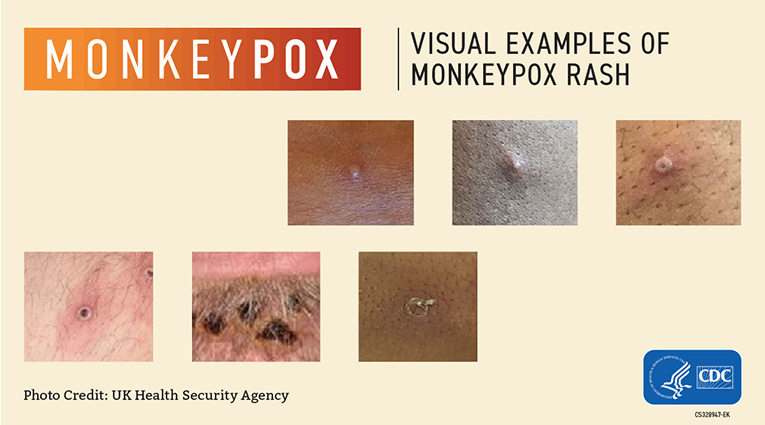Monkeypox has been making international headlines since an outbreak in Europe first spread to the United States in May 2022. It has been declared a national health emergency with
thousands of cases reported across America and a presence in every state.
The monkeypox virus has been around for decades, but it's very uncommon in the U.S. – which makes the 2022 outbreak so unusual.
It's important to know upfront that monkeypox is almost never deadly. Most people in generally good health will recover after a few weeks without any complications.
With so many questions about how monkeypox is spread and who should be vaccinated,
Christian Gausvik, MD, with The Christ Hospital Physicians – Primary Care shares what you need to know – including how to reduce your risk of infection.
How is monkeypox transmitted?
Monkeypox most often spreads through direct, skin-to-skin contact with an infected person's rash or scabs. It can also spread through respiratory fluids during prolonged, face-to-face contact like kissing and cuddling.
People can spread monkeypox from the very first signs of rash. They should be considered contagious until the skin is fully healed.
Monkeypox is not a sexually transmitted disease (STD), but it is very easily spread through sex because of the direct skin contact. Most cases of monkeypox in the United States have been among men who have sex with men – but it's important to note that anyone can contract monkeypox.
"This virus does not infect only a certain type of person," explains Dr. Gausvik. "The current monkeypox outbreak first appeared at an event in Spain that was largely attended by gay men. So it makes sense that we're seeing the initial spread within the LGBTQ+ community worldwide."
How do you know if someone has monkeypox?
The telltale sign of monkeypox is the distinct skin rash that includes red blisters or pimples, called pustules or pox. The rash can appear anywhere on the body, including the face, mouth, genitals or chest, as well as the palms of the hands.
The rash itself can be painful, and some patients may require pain medications until their rash heals completely. As with chickenpox, patients may experience lasting scars, even after their rash has fully healed.

Patients with monkeypox can also expect to experience a fever, chills, fatigue and muscle aches. They may also feel other flu-like symptoms, including a sore throat, cough or congestion.
Monkeypox symptoms typically last 14 – 21 days.
How is monkeypox diagnosed and treated?
If you begin to exhibit monkeypox symptoms or suspect that you have been exposed to monkeypox, contact your primary care provider. Your doctor may initially recommend
a video visit.
"Telehealth appointments offer convenient healthcare access for patients while helping reduce the potential spread of the virus," Dr. Gausvik explains.
During the video visit, your doctor can examine your rash and recommend a skin swab test to confirm your diagnosis if needed.
Patients who have a confirmed case of monkeypox or who have a known exposure to a confirmed case of monkeypox are currently eligible to receive the monkeypox vaccine. This vaccine includes two shots taken one month apart.
"If we see a rash that we feel is consistent with monkeypox, we encourage the patient to get the vaccine as soon as possible," Dr. Gausvik says. "It's important to identify cases early, so we can get the vaccine administered within a relatively short window."
Additionally, immunocompromised patients may wish to speak to their doctor about taking an antiviral medication, such as TPOXX, if they develop monkeypox symptoms. Antivirals can help prevent severe monkeypox complications in patients with weakened immune systems.
The importance of getting vaccinated for monkeypox early
If you know you've been exposed to monkeypox, don't wait to get vaccinated. "Getting your first dose of the monkeypox vaccine within four days of exposure can successfully prevent you from contracting the disease," Dr. Gausvik says.
Even patients who are already exhibiting monkeypox symptoms should get vaccinated right away. If you receive your first dose within 7–10 days of showing symptoms, the monkeypox vaccine can help minimize them.
"Unlike some vaccines, such as the COVID-19 vaccine, the monkeypox vaccine can be effective in reducing the severity of infection even after exposure to the virus," explains Dr. Gausvik.
With monkeypox vaccine becoming increasingly available, doctors may recommend getting your shot early for prevention.
"We have started to vaccinate some individuals locally who have not necessarily been exposed as a preventative measure depending on risk factors," Dr. Gausvik says. "You can check with your local health department about availability."
Local health departments include:
What can I do to prevent monkeypox?
- Avoid close, skin-to-skin contact, including intimate behavior, with people who have a rash that looks like monkeypox
- Have open conversations about monkeypox with your partner before engaging in intimate activity
- Do not handle laundry, bedding, or towels used by someone with monkeypox
- Wear long pants or shirts when attending crowded indoor spaces like concerts and dance halls to reduce skin-to-skin contact with others
- Avoid skin-to-skin contact with anyone exhibiting monkeypox symptoms
- Get the monkeypox vaccine when it becomes more widely available
If you have been diagnosed with monkeypox, you can help stop the spread to others by isolating and avoiding skin-to-skin contact until your rash has cleared.
Still have questions about monkeypox or feel you may have recently been exposed? Talk with your
primary care physician today.